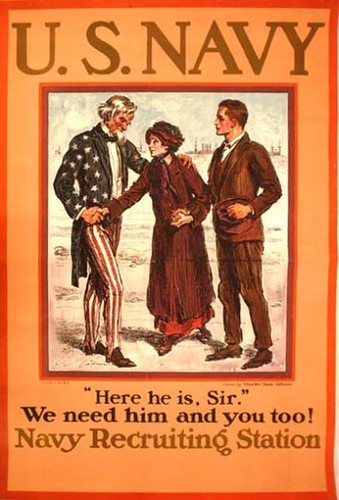
http://www.flickr.com/photos/mfspeccoll/4899716857/
I think this poster should be interpreted according to Meg Albrinck's definition of posters as "instruments of coercion" (James 23). Albrinck says the propaganda poster shaped rather than reflected public opinion, as the government used the medium to present public arguments for patriotic behavior. Each poster thus becomes a distinct rhetorical argument for the continuation of the war, and close examination of a poster's imagery and language can reveal the unique persuasive strategies of the wartime governments.
Albrinck's definition is particularly useful for this poster because she constructs it in relation to "a gendered rhetoric of shame in British war posters"; the "Here he is" poster reveals a parallel rhetoric in American propaganda. The image of a woman shaking Uncle Sam's hand as she leads her male friend/relative to enlist in the navy creates a powerfully gendered rhetoric of obligation and responsibility which targets both male and female viewers. Overtly, the poster places responsibility for enlistment on American women as well as American men; the woman's role as an intermediary in the enlisting process is rewarded with a firm handshake and an avuncular pat on the back from Uncle Sam himself. The text beneath the message ("We need him, and you too!") is explicitly aimed at drawing women into the war effort.
This poster also reaches out to male viewers through the aformentioned gendered rhetoric of shame. While the man in the poster is the picture of strapping American masculinity, he is belittled and rendered subservient within the context of the poster; his hat is off, his posture is shifted slightly forward in supplication, and his arm is inextricably bound up in the dominating grip of the female figure, who herself is subservient to Uncle Sam. The artwork and text objectify the male figure, casting him as a commodity which must be herded into patriotic service. And while the female figure recieves a hearty thanks from Uncle Sam, the man in the poster is left out in the cold from the exchange. While the poster seems to be primarily aimed at female viewers, the message for men is clear: enlist now, before you suffer the shame of being dragged to the recruiting office by a more patriotic female relation.

Comments
Christopher Hol...
Mon, 02/04/2013 - 17:10
Permalink
I very much agree with what
I very much agree with what you're saying here. Another thing that strikes me about this particular poster is the almost business-like way it portrays enlistment. Where the majority of the other posters all frame enlistment or contribution to the war effort as a heroic act, this poster seems to frame enlistment as a rather mundane business transaction, with the mother acting as a middle man between Uncle Sam and the soldier. I think that this might have been used in a poster targeted toward mothers because, while the heroic, adventurous tone espoused by the other posters may have been enticing to prospective soldiers, to their mothers, the prospect of danger with which it is associated must have felt terrifying, to say the least. It is because of this that I feel this poster chooses to cast enlistment in a more business like, and therefore mundane light.